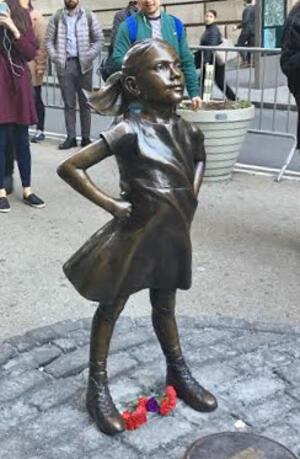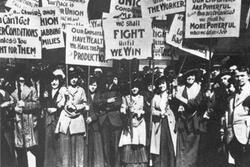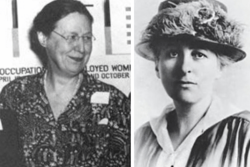Let's Not Forget the Real Fearless Girls
I loved her, when I first saw her: the defiant bronze girl with her flipped ponytail and akimbo arms, staring down Wall Street's snorting, sweeping bull. What a perfect symbol for International Women's Day, I thought. This fearless girl will inspire so many real-life girls to follow in the footsteps of the radical labor activists who created International Women's Day a century ago. They too will be inspired to challenge the most toxic, destructive elements of late-state capitalism.
Then I kept reading. And it turns out that that's not what the fearless girl is about at all.
The statue, which appeared in Bowling Green Park yesterday, was installed by McCann New York and State Street Global Advisors, a Boston-based investment giant. Its stated purpose is to draw attention to the dearth of women in corporate leadership (one presumes that its other, equally important purpose is to advertise for McCann and State Street). The statue is supposed to encourage companies to change their cultures so that women can shatter the glass ceiling and sit on boards and in leadership positions in equal numbers to men. The statue reads on its base: “Know the power of women in leadership. SHE makes a difference.”
This statue has drawn nearly universal praise from what I've seen online. The major media outlets are fawning over it as a bold symbol of female empowerment, and as of this writing more than 3,700 people have already signed a Change.org petition asking that the statue, which is only supposed to remain in the park for a week, remain there permanently. I'm surprised that this is the only perspective I've seen. Frankly, now that I know what that statue represents and where it came from, I see little to praise about it besides the fact that it was designed by a female artist. At best, it's a bland, banal monument to the kind of white feminism that deifies the needs of upper and middle-class women who harbor corporate ambitions. At worst, it's an advertisement, the kind of commodified feminism that gives the whole movement a bad name and erases its working-class origins.
At least some of the other examples of marketplace feminism—the real beauty Dove campaigns, the laundry detergent ads that encourage husbands to do housework— in theory espouse positive ideals (we should value all types of beauty; we should share household duties with our spouses). But this fearless girl statue is not only marketplace feminism, it actively promotes wealthy women's participation in a system that harms and oppresses women of other classes, which includes many women of color. There is nothing intersectional about this statue. There is nothing inclusive. By virtue of its location, its sponsor, and its sentiment, it excludes the vast majority of women.
It's particularly galling that this statue was rolled out on International Women's Day. The first International Women's Day was celebrated on February 28, 1909, by the Socialist Party of America. March 8 became the celebration date in 1917, when tens of thousands of women took to the streets of St. Petersburg to demand bread—helping kick off the Russian Revolution. During these decades, countless women participated in the labor movement, agitating for safer working environments, protections against sexual harassment in the workplace, shorter workdays, and child labor laws. These women went on strike; they made speeches; they advocated for change, from Theresa Wolfson, who lobbied for minimum wage and for an eight-hour work day, to Rose Schneiderman, who galvanized protests against the tragedy of the Triangle Shirtwaist Factory fire. How far have we fallen from “Fight for reforms” or even “Tear down toxic system” when “Lean in and also make money for State Street!” feels like a revolutionary testament to women’s capacity in the workplace?
Of course, women have every right to go into finance and shatter that glass ceiling if they want to; financial freedom is certainly a very powerful kind of freedom, and saying that every woman in the world is morally obligated to become a rabble-rousing labor activist is another kind of oppression. Still, the capitalist system as it currently exists in America concentrates wealth in a few hands while failing to provide adequate workplace protections, minimum wage legislation, and basic support for everyone else. Just yesterday the New York Times reported that the total share of the United States' economic output that goes to workers has been falling in recent decades and has not risen above 59 percent since the recession. These issues affect the majority of society, which means they affect the majority of women. It's specious at best to pretend that feminism equals a few women fighting their way to the top of this deeply flawed system and then calling it a day.
The women of the early twentieth century knew that making a difference for all women required deep systemic change. They fought to humanize the industry that the fearless girl statue unilaterally celebrates. As we look forward to the year ahead, to International Women's Day 2018 and beyond, let's not confuse white marketplace feminism with the real feminist tenets of inclusion, dialogue, and fighting for change for all women. Let's elevate the true heirs to those early twentieth century rabble-rousers: the women planning strikes, the women calling for intersectionality, minimum wage reform, and protections for working parents. These women, not the fearless girl on Wall Street, are the real sign of change.








Great article!
Good article!